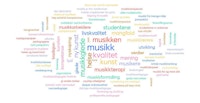Internationally, we live in uncertain times, with wars in Ukraine and the Middle East, political instability around the USA and China, and political polarization. We notice the consequences in the form of a stronger emphasis on security and preparedness and problems with collaboration across national borders - for example, in research.
Other political conflict lines that the education sector will notice are trade and foreign policy, where the risk of downscaling broad international collaborations can lead to more regional cooperation between countries and debate about Norway's connection to the EU. However, the EU is also marked by unrest and political polarization.





